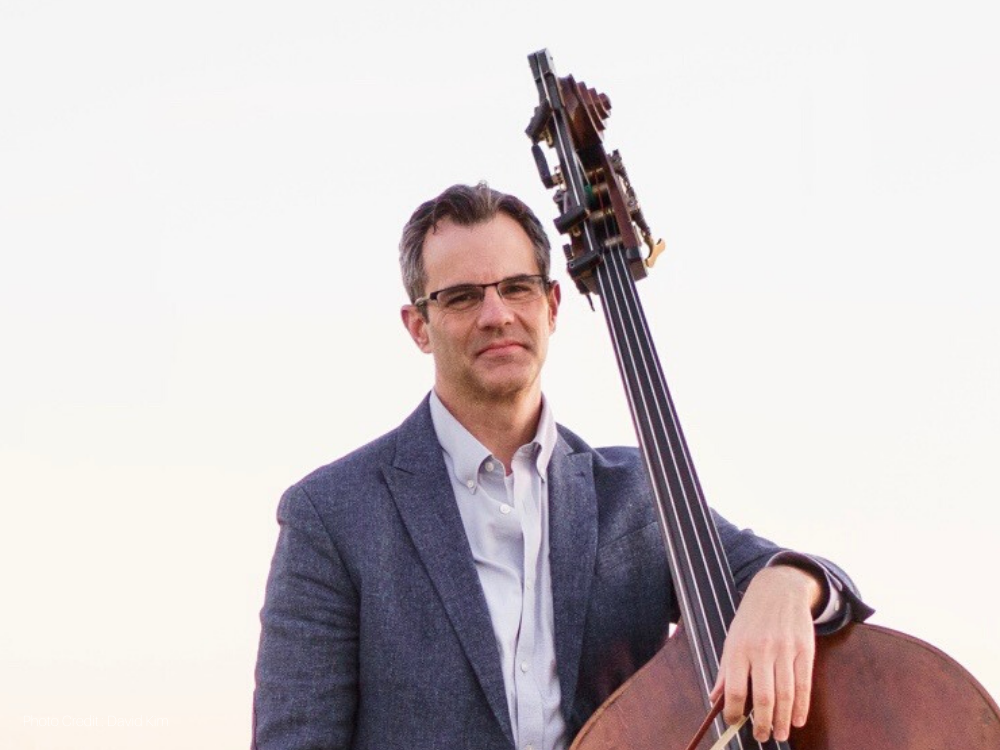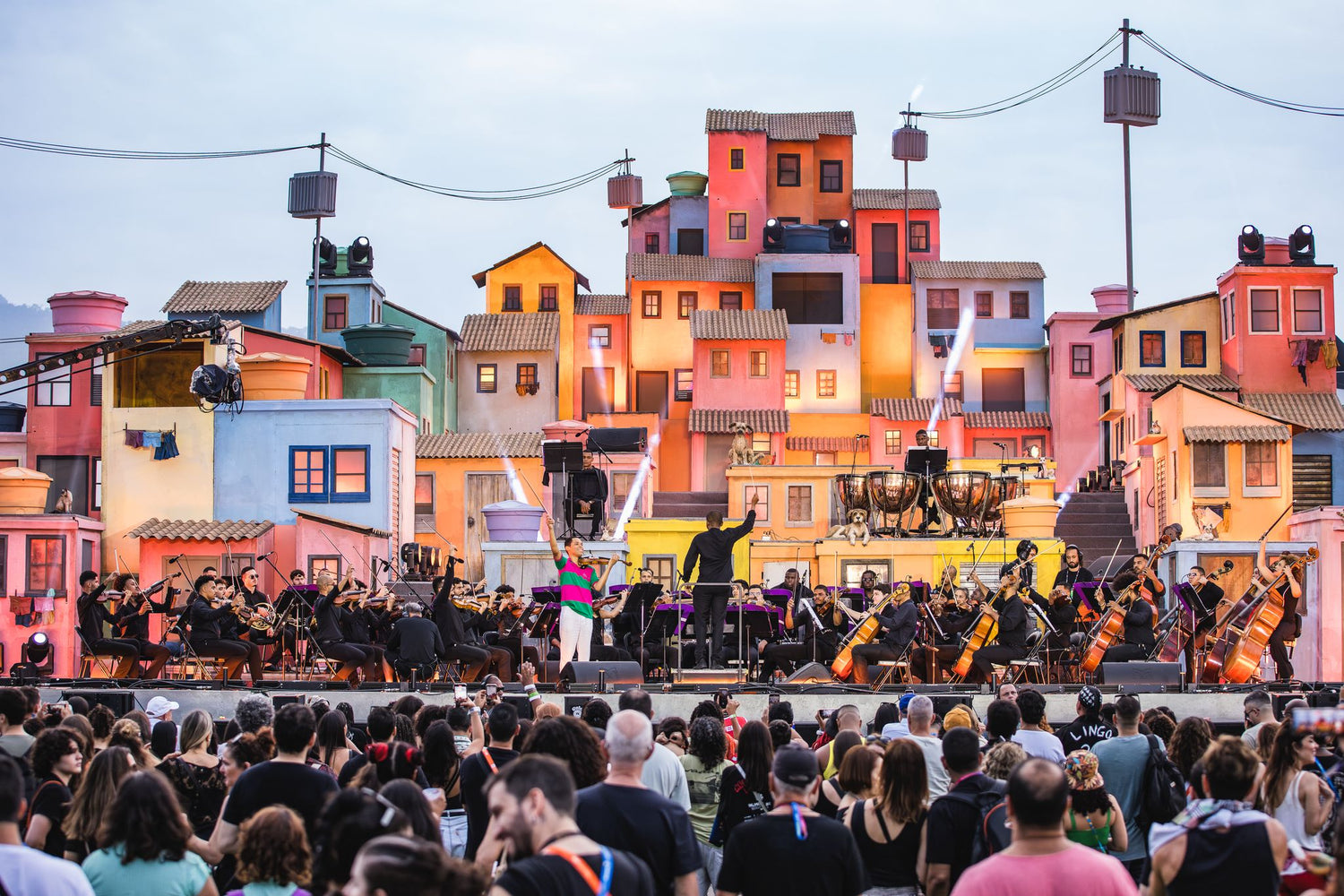San Francisco Symphony’s principal bassist moonlights as a metal rock star.
Scott Pingel started out playing electric bass in funk and R&B bands, covering everything from Weather Report, to Earth, Wind & Fire and Tower of Power. So, when the San Francisco Symphony’s principal bass player recently had the opportunity to rock on stage with Metallica, you could say his performance repertoire came full circle.

By Rachel Watkins
With degrees from the University of Wisconsin-Eau Claire and the Manhattan School of Music, Pingel spent some time at Michael Tilson Thomas’s New World Symphony before serving as principal bass with the Charleston Symphony and then assuming that same role in San Francisco in 2004.
Like many of his SFS colleagues, Scott devotes a lot of time to the San Francisco Conservatory of Music, where he’s taught for almost 10 years. He also has an affinity for scuba diving.
Read on for our interview with this impressive talent.
You just performed a solo with Metallica at the Chase Center. Tell us more!
That was really special; it was part of Metallica’s S&M2 — the second collaborative performance between the band and the San Francisco Symphony [the first was in 2004]. I performed a special tribute version of the late bassist Cliff Burton’s ‘Anesthesia (Pulling Teeth)’ on a stand-up bass.
The idea for the solo came to mind months ago after [SFS music director] Michael Tilson Thomas pulled me aside last March and spoke to me about the possibility of doing some kind of feature on the program. I invested many hours to plan the solo tribute that I wanted to do — I even had a company in Italy called Alter Ego make me an electric upright bass. It really was a labor of love, so you can imagine how rewarding it was to finally get the seal of approval in late August.
" Metallica wanted to hear it for themselves before the show. "
Metallica wanted to hear it for themselves before the show. So, I performed it in front of band members Lars Ulrich, Kirk Hammett, and Robert Trujillo along with Metallica’s entourage of managers and more. That was almost as surreal as the actual concert! Right now, they’re working on editing the audio-only version, which will be released in February 2020. The concert is a movie, too, which has been seen on about 3,700 screens in almost 100 countries world-wide, and will be released on Amazon and Netflix in 2020, as well. You can learn more at metallica.film.
You used to play the electric bass across a variety of genres. How did you make the transition to the double bass and classical music?
Yes, I started on electric bass; it was my main instrument initially. I only started playing the double bass because I thought I had to. I was 17, a senior in high school, and I realized I should probably learn the upright if I wanted to go to study music in college. It’s funny… my high school in Wisconsin didn’t have an orchestra program, but they did have this old white bass made of fiberglass like the ones you’d see in ‘60s show bands. It was all busted up, but I took it home and glued the fingerboard back on and did my best to teach myself how to use it. I was really determined and fell in love with it. I was initially interested in jazz only and not an orchestral career. But, a teacher encouraged me to pursue classical music, so I took an audition for the Manhattan School of Music and I got it — along with a free ticket into New York City life. And, the rest is history I guess you could say!
What’s your favorite part about playing with the San Francisco Symphony?
I love the power of the orchestra, the sublime performances, and the depth of artistry in the musicians. I work with wonderful people and get to play some amazing, beautiful music.
" I work with wonderful people and get to play some amazing, beautiful music. "
What does concert prep look like for you?
Well, for me, preparation for a concert starts at least a couple weeks in advance. Right now, I’m working on Shostakovich’s Symphony No. 7, which we will be performing in two weeks. And, I actually have another piece of music on my stand that we’re not performing until February, but it’s challenging and I want to get ahead of it.
 How do you juggle your time between being a professional musician, teacher, a father, and a husband? That’s a lot!
How do you juggle your time between being a professional musician, teacher, a father, and a husband? That’s a lot!
It is a lot; and it can be really difficult sometimes to balance both professional and personal — especially during the concert season when my schedule is in full swing. I also play a lot of jazz and chamber music gigs on top of the symphony concerts because I just love to do them. And, I have 12 students at the San Francisco Conservatory who I really enjoy working with. I just have to be careful because I do get burned out and I don’t always realize I am doing too much until it’s too much. My family and I just went to Yosemite and those were some of my first days off in a long time, so it was so nice to take a break from the whirlwind and just turn off. I highly recommend it!
" You have to do music because you love it. It’s really a career that chooses you. "
What advice do you have for aspiring young musicians?
You have to do music because you love it. It’s really a career that chooses you. The industry can be difficult and competitive, so the deeper you feel a commitment to that greater musical truth existing both within and without, and find meaning in the music you're playing. But, I will say that sometimes the most important thing you can do is NOT practice. I was a bit obsessive at one time, so I know firsthand that you cannot let it become an all-consuming thing, either.
Who has been your most influential teacher?
I’ve had some really great teachers. But, my bass teacher, Peter Lloyd, who currently teaches at Colburn, was instrumental in steering me towards a classical career. I only studied with him for about eight months, but he was the one who advised me to go to Manhattan. So, Peter had a big part in turning my life in that direction.
On a rare day off, what is your favorite thing to do in San Francisco?
Well, I actually live in Mill Valley now, which is a very different experience than living in the heart of the city. I find the weather to be so much better, and there are so many hiking trails. So, a staycation here at home is a beautiful experience in and of itself. I enjoy spending time with family and just soaking in the surrounding nature. Oh, and I also love to scuba dive and have completed my advanced certification and I am doing my rescue diver certification now. So, that keeps me busy.
Tell us about your martial arts background.
Yes, I trained in Hwa Rang Do, an ancient Korean martial art, for almost 10 years. I reached black belt status and actually did quite a bit of teaching, too. I just loved it, but I got to a point with music that I had to let it go. It’s difficult to do martial arts and music halfway — you’re either all-in or not. And, in graduate school, life was yanking me to a full-time music direction. That said, training in Hwa Rang Do was very influential for developing discipline and understanding both the strength and fragility of human body and mind. Funny enough, I actually credit the martial art with meeting my wife. I was fascinated with Korean culture, and I knew a few Korean words here and there and I was out with some friends, speaking the language. My wife heard me — she is of Korean descent — and that’s sort of how we met.
If you were not a bass player today, what would you be?
I cannot realistically imagine anything different right now, but I guess I could really get into the idea of being a scuba dive instructor.
" I use the Coltrane – it’s actually what I was wearing in the Metallica show! "
What Coregami items are you using, and how have they been useful to you?
Coregami is like the greatest thing to come to music since steel strings; the shirts are so awesome. They have completely changed the way I feel when I perform. I can move more freely; it’s a completely different world of comfort from anything I had experienced before. I use the Coltrane – it’s actually what I was wearing in the Metallica show! And I use the Gershwin for symphony performances. I actually really hope Coregami expands its product line to full outfits; I know I’d love to have the full tux — jacket, vest, trousers, the whole nine!





 How do you juggle your time between being a professional musician, teacher, a father, and a husband? That’s a lot!
How do you juggle your time between being a professional musician, teacher, a father, and a husband? That’s a lot!


